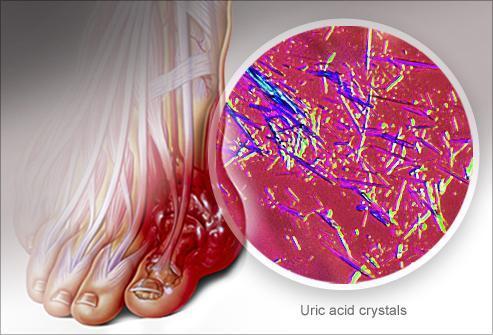How to Treat Gout With Diet and Medication
How to Treat Gout With Diet and Medication
Gout usually attacks a single joint suddenly and intensely. Typically, the first metatarsophalangeal joint (the big toe) is involved, but other joints may be affected. Gouty joints show visible signs of inflammation (i.e., redness). The primary goal of treatment is to suppress an existing attack and prevent future gout attacks.
Time Required: Variable
Here’s How:
An initial attack of gout may last several days and disappear even if untreated. Subsequent attacks may not occur for weeks, months, years, or not at all. Severe cases of gout (i.e., repeated attacks occurring over a long period) may cause damage to the affected joints and loss of mobility. A treatment plan is essential for preventing attacks and joint damage.
Gout is related to an inherited abnormality for processing uric acid in the body. Uric acid levels can become elevated by eating an excessive amount of purine-rich foods, when there is overproduction of uric acid by the body, or when the kidneys do not eliminate excess uric acid.
Treatment goals include terminating acute gout attacks, relief of pain and inflammation, preventing future attacks, and avoiding complications (e.g., formation of tophi, kidney stones, and joint destruction).
Though gout treatment is most often treated successfully and without complications, it becomes more of a challenge if other conditions exist along with gout or if there is poor patient compliance to recommended lifestyle changes or a medication regimen.
Dietary alterations are recommended, such as avoiding a purine-rich diet. Other preventive measures include maintaining adequate fluid intake, weight reduction, reduction in alcohol consumption, and medications to reduce hyperuricemia.
Medications for gout include:
non-steroidal anti-inflammatory drugs (NSAIDS)
colchicine
corticosteroids
adrenocorticotropic hormone (ACTH)
allopurinol
probenecid
sulfinpyrazone
Uloric (febuxostat)
Krystexxa (pegloticase)
NSAIDS are commonly the first medications prescribed to treat acute gout. Indomethacin is considered effective. Other NSAIDS may be equally effective. NSAIDS are initially prescribed at the maximum allowable dosage and reduced as symptoms subside. The medication should be continued until pain and inflammation are non-existent for at least 48 hours. COX-2 inhibitors may be useful for patients with gastrointestinal concerns but their use for acute gout has not been specifically studied or reported.
Colchicine is used to treat acute flares of gouty arthritis and to prevent recurrent acute attacks. Colchicine does not cure gout or take the place of other medicines that lower the amount of uric acid in the body. The drug prevents or relieves gout attacks by reducing inflammation. Colchicine may be used in 2 ways: some people take small amounts of it regularly for months or years, while others take large amounts of colchicine during a short period of time (several hours).
Corticosteroids or adrenocorticotropic hormone can be used for patients who cannot take NSAIDS or colchicine. Patients with acute gout typically receive daily doses of prednisone (20-40mg) or its equivalent for 3 to 4 days, then it is tapered gradually over one to two weeks. ACTH is administered as an intramuscular injection (an initial dose and subsequent doses over several days as needed).
Allopurinol (brand name - Zyloprim), which is prescribed for chronic gout or gouty arthritis, works by affecting the system that manufactures uric acid in the body. It is used to prevent gout attacks, not to treat them once they occur.
Probenecid (brand names - Benemid, Probalan) is prescribed for chronic gout and gouty arthritis. It is used to prevent attacks related to gout, not treat them once they occur. It acts on the kidneys to help the body eliminate uric acid. Probenecid is known as a uricosuric agent.
ColBenemid (other brand names are Col-Probenecid and Proben-C) is a gout medication that contains Probenecid, which is a uricosuric agent, and Colchicine, which has anti-gout properties.
Sulfinpyrazone (brand name - Anturane) is also known as a uricosuric agent and is used to treat gouty arthritis. It works by lowering the amount of uric acid in your blood, preventing gout attacks. The drug helps prevent attacks but is not used to treat an attack once it has started. Sulfinpyrazone is not currently available in the U.S.
Losartan, (brand names - Cozaar and Hyzaar), is not specifically a gout medication but is an angiotensin II receptor antagonist, antihypertensive drug that may help control uric acid levels. Fenofibrate, (brand name - Tricor), is not a specific gout medication but it a lipid-lowering drug that may help uric acid levels.
Analgesic painkillers are also used to relieve the intense pain of gout. All of the aforementioned drugs can be used in combination, to control symptoms, prevent future attacks, and maintain healthy uric acid levels.
Krystexxa (pegloticase) is a biologic drug. It works by breaking down uric acid. It is used in gout patients who either failed or cannot tolerate conventional gout medications.
Uloric (febuxostat) is a drug used for the chronic management of hyperuricemia in gout. Uloric lowers serum uric acid levels by blocking xanthine oxidase – the enzyme responsible for uric acid production.
Tips:
Maintain adequate fluid intake.
Keep your weight under control. Obesity has been linked to gout.
Dietary changes can help prevent gout attacks. Avoid a purine-rich diet. Reduce alcohol consumption.
Medications can help control pain and inflammation of a gout attack and help prevent future attacks by eliminating excess uric acid or affecting the production of excess uric acid.
Be compliant with the treatment plan your doctor recommends.
What You Need:
Diet low in purines.
Medication to control pain.
Medication to control inflammation.
Medication to control level of uric acid.
by Carol Eustice For Very Well
Be the first to post a message!
